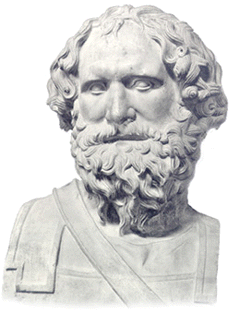...Best of Sicily presents... Best of Sicily Magazine. ... Dedicated to Sicilian art, culture, history, people, places and all things Sicilian. |
by Vincenzo Salerno | ||
Magazine Index Best of Sicily Arts & Culture Fashion Food & Wine History & Society About Us Travel Faqs Contact Map of Sicily |
Timaeus ("Timeo" in Italian) was for a long time exiled to Athens by Agathocles (tryant of Syracuse and later king of Sicily), described by Niccolò Macchiavelli as one of "those who by their crimes become princes." Indeed, much of what we know of Agathocles comes to us from Timaeus, who was probably biased against him. This is perhaps understandable, and he was not alone in his criticisms of Agathocles. It was during his exile that Timeaus completed his best known work about Sicily and Greece, including biographies of Agathocles and Pyrrhus, with notes on the cities and rulers of Syria. He was not without his detractors; Polybius referred to him as "Epitimaeus" (he who finds faults with others). It was claimed that he overzealously criticised not only Agathocles but also Dionysios I of Syracuse while blindly defending Timoleon. At this distance of time we cannot know with certainty whether Polybius was justified in his statements about Timaeus' work; he probably had his own axe to grind. On the other hand, Diodorus Sicilus and Cicero relied heavily on the writings of Timaeus. Plutarch was also a fan. Timaeus is credited with dividing Greek history into olympiads. Though strongly identified with eastern Sicily, Timaeus actually lived in Athens for some fifty years, returning to the island of his birth only during the rule of Hieron I. He died around 250 BC, probably in Syracuse. We have no reliable contemporary images of him. (The sculpture shown on this page is not Timaeus.) Diodorus Siculus, Timaeus' fellow Sicilian, was known for his fanciful interpretation of history. (They were not contemporaries; Diodorus lived two centuries later.) Timaeus probably did not stray as far as Diodorus from the facts, and most of his chronicles were not especially flowery or given to random philosophizing or conjecture. More generally, the matter of reliability and credibility does give us reason to challenge many accounts of ancient history. Today it is commonplace to approach any history from a multidisciplinary perspective, viewing it in tandem with archeological and scientific evidence. Moreover, few historical works of the classical period survive in their original form, instead having been transcribed in medieval times, and this implies occasional editing or mistranslation by the scribes. All things considered, however, the work of Timaeus holds up to modern scrutiny remarkably well. About the Author: Palermo native Vincenzo Salerno has written biographies of several famous Sicilians, including Frederick II and Giuseppe di Lampedusa. | |
Top of Page |
 Timaeus was a Siceliot (
Timaeus was a Siceliot (